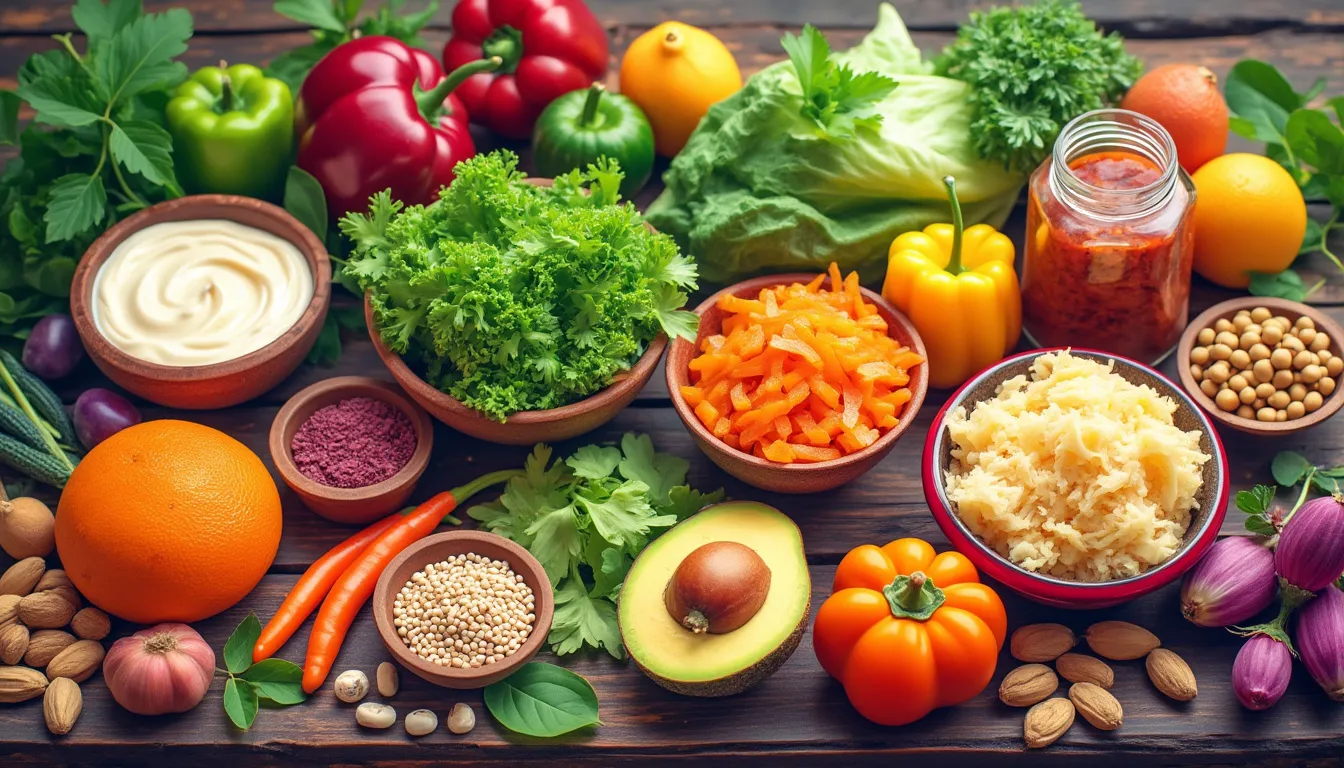In recent years, our understanding of gut health has expanded significantly, revealing the intricate link between our digestive system and overall well-being. At the center of this revelation lies the gut microbiome—a diverse community of trillions of microorganisms residing in our intestines, crucial for maintaining digestive wellness and beyond. Research indicates that a well-balanced gut microbiome not only aids in efficient digestion but also plays a vital role in regulating immune function, mental health, and even metabolic processes. However, when this delicate balance is disrupted, often signaled by digestive discomfort, fatigue, or even skin irritations, it can lead to a host of health concerns.
One effective way to nurture your gut is through diet, specifically focusing on gut-friendly foods. Incorporating high-fiber fruits and vegetables, such as apples and broccoli, alongside fermented options like yogurt and sauerkraut, can significantly impact your gut’s health. These foods help support the growth of beneficial bacteria and contribute to diverse microbial populations. Furthermore, understanding the role of probiotics—live beneficial bacteria—and prebiotics—compounds that fuel these bacteria—can empower you to make informed dietary choices that bolster gut resilience.
The benefits of committing to a gut-friendly diet are profound. Improved digestion and enhanced nutrient absorption are among the primary advantages, but the positive effects extend far beyond the gut. Studies have shown that a healthy gut can support cognitive function, reduce symptoms of anxiety and depression, and strengthen immune defenses, making it a cornerstone of a holistic health strategy.
For those eager to embrace this dietary approach, practical strategies such as meal planning and experimenting with gut health recipes can make the transition smoother. By gradually introducing dietary changes, like swapping out processed foods for nutrient-dense alternatives, you can foster an environment where your gut microbiome thrives. Ultimately, investing in your gut health is not just about addressing immediate digestive concerns—it is a transformative step towards optimizing overall health and well-being.
Understanding the Importance of Gut Health
The importance of gut health has gained considerable attention in recent years, with researchers uncovering the complex interplay between our digestive system and overall well-being. At the heart of this emerging field is the gut microbiome, a diverse community of trillions of microorganisms residing in the gastrointestinal tract. This ecosystem consists of bacteria, viruses, fungi, and other microbes that play an integral role in maintaining digestive wellness and influencing various aspects of health.
The gut microbiome is involved in numerous bodily functions, including digestion, metabolism, immune response, and even brain health. According to research from the Human Microbiome Project, these microbes break down indigestible fibers, producing short-chain fatty acids that contribute to gut health and energy metabolism. Moreover, the microbiome produces essential vitamins, such as B-vitamins and vitamin K, which are vital for various bodily functions.[NIH]
The balance of the gut microbiome is crucial for maintaining overall health. An imbalance, often referred to as dysbiosis, can trigger a host of health issues, ranging from digestive disorders to systemic inflammation. Researchers at Harvard Medical School have noted the potential links between dysbiosis and conditions such as irritable bowel syndrome (IBS), obesity, diabetes, and even mental health disorders like depression and anxiety.[Harvard Nutrition Source]
Identifying the signs of an unhealthy gut can be the first step towards achieving better digestive wellness. Common indicators of gut health issues include persistent indigestion, bloating, and irregular bowel movements, such as constipation or diarrhea. Additionally, an unhealthy gut microbiome can manifest through symptoms not directly related to the digestive tract. For instance, unexplained fatigue, food intolerances, and frequent infections can all signal an imbalance in gut flora.
Interestingly, the gut-brain axis—a bidirectional communication network between the gut and brain—suggests that gut health may also influence psychological states. Studies have shown that a disturbed microbiome can contribute to mood swings, anxiety, and depression. The production of neurotransmitters, such as serotonin, which is significantly produced by the gut, further underscores this connection between gut and mental health.[NIH]
Furthermore, the immune system heavily relies on a balanced gut microbiome. Nearly 70% of the immune system is located in the gut, where the microbiome acts as a barrier against pathogens and trains immune cells to differentiate between harmful invaders and the body’s own tissues. Imbalances in gut flora can compromise immune responses, leading to heightened susceptibility to infections and the development of autoimmune diseases.[Journal of Allergy and Clinical Immunology]
Recognizing the vital role the gut microbiome plays in health, it becomes clear that maintaining its balance can lead to profound improvements in overall well-being. Research suggests that adopting a gut-friendly diet is one of the most effective strategies for promoting gut health. By understanding the impact of the gut microbiome and identifying signs of imbalance, individuals can take proactive steps toward fostering a healthier gut environment, ultimately optimizing their health journey.

Key Components of a Gut-Friendly Diet
A gut-friendly diet emphasizes the intake of foods that support the diverse bacterial community within the human gastrointestinal tract, known as the gut microbiome. Key components of such a diet include high-fiber foods, fermented products, and an appropriate balance of lean proteins. Understanding the intricate dance between these food types and gut health can illuminate the path to optimizing digestive wellness.
High-Fiber Fruits and Vegetables
Fiber plays a pivotal role in maintaining gut health. It exists in two primary forms: soluble and insoluble fiber, each serving unique functions within the digestive system. Soluble fiber, found in foods like oats, apples, and beans, dissolves in water, forming a gel-like substance that helps regulate blood sugar and cholesterol levels. Insoluble fiber, prevalent in whole grains and vegetables such as spinach and kale, adds bulk to stool, aiding in regular bowel movements.
According to a study published in the journal Frontiers in Microbiology, dietary fiber acts as a nourishment source for gut bacteria, particularly the beneficial types like Bifidobacteria and Lactobacillus. These microbes ferment fiber into short-chain fatty acids (SCFAs), such as butyrate, known to nurture colon cells and reduce inflammation.
Fermented Foods
Fermented foods are rich in probiotics, live bacteria that contribute positively to the microbiome’s diversity and resilience. Popular examples include yogurt, kefir, sauerkraut, and kimchi, each of which hosts a plethora of health-promoting bacteria. A pivotal study in the journal Nature Reviews Gastroenterology & Hepatology suggests that regular consumption of fermented foods can enhance gut microbial diversity and balance, potentially lessening the risk of gastrointestinal disorders.
Lean Proteins
While often associated with muscle building, proteins also contribute to gut health. Lean protein sources such as chicken, fish, and legumes provide essential amino acids crucial for the repair and maintenance of intestinal lining integrity. A diet comprising lean proteins can help prevent the development of leaky gut, a condition where the gut barrier becomes permeable and potentially allows toxins to enter the bloodstream.
The Role of Probiotics in Gut Health
Probiotics are beneficial bacteria that support gut health by enhancing or restoring the gut flora. They are naturally found in some of the foods mentioned above, such as yogurt and kefir, and can also be consumed in supplement form. These friendly microbes compete with harmful bacteria for resources, aiding in maintaining a balanced gut environment. Research by the American Journal of Clinical Nutrition highlights probiotics’ role in managing irritable bowel syndrome (IBS) and reducing the incidence of diarrhea caused by antibiotic use.
The Significance of Prebiotics
Complementing probiotics, prebiotics are non-digestible fibers and plant compounds that act as food for these beneficial bacteria. Common prebiotics include inulin, fructo-oligosaccharides (FOS), and galacto-oligosaccharides (GOS), found in foods such as garlic, onions, bananas, and asparagus. According to the Journal of Nutrition, prebiotics selectively stimulate the growth of bifidobacteria, enhancing gut health and fortifying the intestinal barrier.
Furthermore, recent insights suggest that a combined approach of consuming both prebiotics and probiotics—termed synbiotics—can amplify their individual benefits, potentially offering more substantial health improvements for the gut microbiome.

Adopting a gut-friendly diet can yield numerous benefits that extend beyond the confines of the digestive system, impacting both mental health and immune function in profound ways. A well-nourished gut can lead to improved digestion and nutrient absorption, a reduction in gut-related issues and diseases, and even contribute to enhanced overall well-being. Let’s explore how these benefits manifest through carefully chosen dietary habits.
Improved Digestion and Nutrient Absorption
The gut plays a critical role in breaking down food and absorbing nutrients, and a gut-friendly diet enhances these functions significantly. Consuming foods rich in dietary fiber, such as whole grains, fruits, and vegetables, promotes regular bowel movements by adding bulk to the stool, which eases passage through the digestive tract. According to the American Dietetic Association, adequate fiber intake is also associated with a reduced risk of developing conditions such as diverticulosis and colorectal cancer.
Further, the inclusion of fermented foods like yogurt, kefir, and sauerkraut provides a natural source of probiotics. These beneficial bacteria assist in the breakdown of nutrients and contribute to the maintenance of a balanced gut microbiome. Studies published in the journal Nutrition in Clinical Practice highlight that an optimal gut flora composition aids in the efficient extraction of essential vitamins and minerals from the food we consume, supporting overall health and vitality.
Positive Impacts on Mental Health and Immune Function
Emerging research highlights the gut-brain axis, a complex communication network linking the gut and brain. Evidence suggests that a healthy gut microbiome plays a role in mental health, potentially influencing conditions like anxiety and depression. A study published in General Psychiatry found that the consumption of fermented foods, replete with probiotics, may mitigate symptoms of social anxiety and contribute to emotional well-being.
The relationship between diet and immunity is equally significant. Approximately 70% of the immune system is located within the gut-associated lymphoid tissue (GALT), which underscores the influence of the gut on immune function. Prebiotic and probiotic-rich diets have been shown to enhance immune responses by modulating the activity of immune cells, such as increasing the production of antibodies. A well-balanced microbiome also serves as a protective barrier against pathogenic bacteria, reducing the likelihood of infections.
Reduction in Gut-Related Issues and Diseases
A diet emphasizing gut health can also reduce the prevalence of various gastrointestinal issues. Conditions such as irritable bowel syndrome (IBS), inflammatory bowel disease (IBD), and small intestinal bacterial overgrowth (SIBO) can be exacerbated by an imbalanced gut microbiome. Inclusion of gut-friendly elements, like soluble fiber found in oats and legumes, has been shown to alleviate symptoms of IBS by regulating bowel movements and minimizing discomfort.
Moreover, the anti-inflammatory properties of polyphenols — found abundantly in foods like berries, olives, and dark chocolate — can soothe inflammation within the gut. Research featured in the journal Gastroenterology & Hepatology suggests that such dietary components may play a role in the management of conditions like colorectal cancer and Crohn’s disease, enhancing both prevention and recovery by reducing inflammatory markers.
In essence, a gut-friendly diet does not solely address digestive concerns but extends its benefits to emotional stability, immune defense, and disease prevention. By making informed dietary choices, individuals can harness the power of nutrition to promote a balanced and harmonious gut environment. The interconnectivity of our bodily systems means that nurturing one aspect, such as gut health, invariably supports broader facets of health and well-being.

Practical Tips for Incorporating Gut-Healthy Foods into Your Daily Routine
Adapting to a gut-friendly diet can seem daunting at first, but with a bit of planning and the right approach, it can seamlessly become part of your daily life. Here, we offer practical advice on meal planning and recipe suggestions, as well as guidance on how to gradually introduce dietary changes for optimal gut health. By integrating these strategies, you can support your gut health while enjoying a varied and delicious diet.
Meal Planning for a Gut-Friendly Diet
Effective meal planning is pivotal when transitioning to or maintaining a gut-friendly diet. Start by incorporating a variety of high-fiber fruits and vegetables, lean proteins, and fermented foods into your weekly meal plans.
One effective strategy is to dedicate a day each week to sketch out your meals, focusing on diverse, gut-nourishing ingredients. For instance, aim to include at least one serving of fermented food, such as yogurt or sauerkraut, daily. In addition, plan meals around whole grains like quinoa or oats, known for their fiber content, which promotes digestive wellness.
Recipe Suggestions for a Gut-Friendly Diet
Creating meals that are both appetizing and gut-friendly can be an enjoyable culinary adventure. Here are a few recipe ideas to get you started:
- Breakfast: Overnight oats with chia seeds and mixed berries. Top with almonds and a dollop of Greek yogurt to add probiotics and enhance gut health.
- Lunch: Quinoa salad with mixed greens, cherry tomatoes, cucumber, and a sprinkle of flaxseeds. Toss with a lemon-olive oil dressing for a refreshing and fiber-rich meal.
- Dinner: Grilled salmon with steamed broccoli and a side of kimchi. The salmon provides lean protein and omega-3 fatty acids, supporting both heart and gut health.
- Snack: Carrot sticks with hummus, which incorporates chickpeas—another excellent source of fiber and prebiotics.
Gradually Introducing Changes to Your Diet
Transitioning to a more gut-friendly diet doesn’t have to happen overnight. Gradual changes can lead to a more sustainable lifestyle modification, reducing the risk of digestive discomfort that may arise from sudden dietary shifts.
Begin by adding more fiber-rich foods into your meals, starting with small increases. For example, replace white bread with whole grain alternatives and include one or two extra servings of vegetables per day. As your body adjusts, continue to diversify your diet with a wider array of gut-friendly choices.
It’s also beneficial to incorporate fermented foods slowly, especially if they are new to your diet. Try a small amount, like a tablespoon of sauerkraut or a few sips of kefir, and monitor your body’s response before increasing the quantity.
Mindful Eating and Hydration
Alongside dietary changes, mindful eating practices can greatly benefit your gut health. Take time to chew food thoroughly, which aids digestion and allows nutrients to be more effectively absorbed. Pay attention to hunger cues and eat in response to them, rather than out of habit or stress.
Moreover, staying hydrated is crucial for digestive health, as it helps maintain the mucosal lining of the intestines and supports the breakdown of food, aiding in the smooth passage through the digestive tract. Aim to drink at least 8 cups of water daily, adjusting based on your activity level and environmental conditions.
Incorporating Probiotics and Prebiotics
Including probiotics and prebiotics in your diet requires thoughtful consideration. Probiotics, found in live-culture yogurts, kefir, and certain supplements, introduce beneficial bacteria to the gut environment. Prebiotics, found in foods like onions, garlic, and bananas, feed those beneficial bacteria, promoting a healthy microbiome.
To maximize their benefits, consider introducing probiotic-rich foods during meals and prebiotic foods as snacks. This tandem approach ensures your meals contribute to a balanced and nourishing environment for gut flora.
In summary, integrating gut-healthy foods into everyday life is about making informed choices and implementing gradual changes. Through careful meal planning, creative recipes, and an awareness of meal timing and composition, you can cultivate a nurturing habitat for your gut microbiota. Remember, fostering a healthy gut is not just about short-term dietary adjustments; it’s about establishing a sustained lifestyle that promotes comprehensive well-being.
In conclusion, nurturing your gut through a carefully curated diet offers a multitude of health advantages that extend far beyond mere digestion. At the heart of these benefits lies the gut microbiome, a complex community of microorganisms that plays a pivotal role in maintaining our overall health, from digestive wellness to mental well-being and immune function. Recognizing the signs of an unhealthy gut is the first step towards optimizing gut health. Symptoms such as frequent bloating, constipation, or even unexplained fatigue may indicate that your gut needs attention and care.
A gut-friendly diet primarily revolves around incorporating high-fiber fruits and vegetables, fermented foods, and lean proteins. These components are crucial as they not only provide essential nutrients but also support the growth and diversity of beneficial gut bacteria. Probiotics, the live microorganisms found in certain foods and supplements, together with prebiotics, which serve as nourishment for these beneficial microbes, are fundamental in establishing and maintaining a healthy gut environment.
The benefits of this dietary approach are manifold. Improved digestion and nutrient absorption are just the starting points. Emerging research suggests that a balanced gut microbiome can positively influence mental health by potentially reducing the risk of anxiety and depression. Furthermore, the gut’s role as a critical component of the immune system underscores the importance of a gut-friendly diet in shielding the body against various diseases.
To seamlessly incorporate these gut-healthy foods into your daily routine, practical strategies such as meal planning and exploring new recipes can be immensely helpful. Starting with small, gradual dietary changes ensures that your gut can adapt efficiently, minimizing the risk of discomfort and maximizing the health benefits. Overall, prioritizing your gut health is a proactive step towards a healthier, more balanced life, underscoring the profound connection between diet and well-being.
